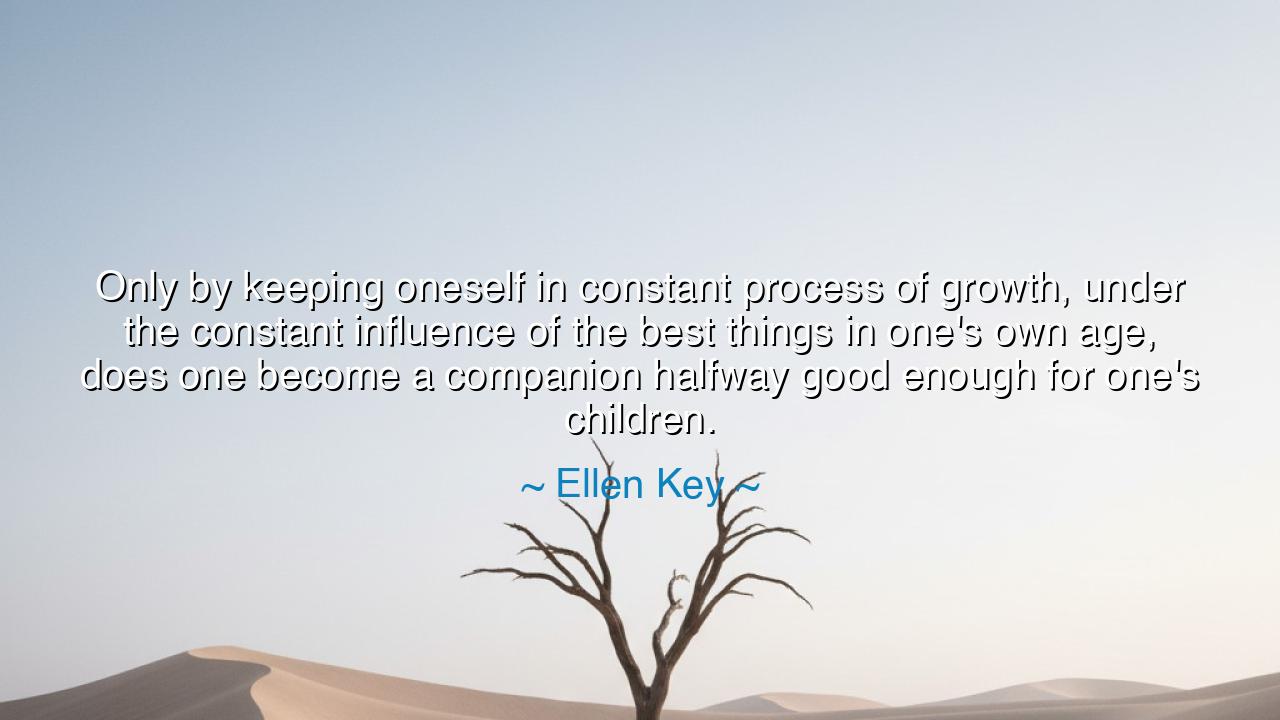
Only by keeping oneself in constant process of growth, under the
Only by keeping oneself in constant process of growth, under the constant influence of the best things in one's own age, does one become a companion halfway good enough for one's children.






In the grand arc of life, there is one profound truth that rings throughout the ages: to be worthy of guiding the next generation, one must continually strive for growth, learning, and excellence. Ellen Key, in her reflection on the relationship between parent and child, captures this truth in her statement: "Only by keeping oneself in constant process of growth, under the constant influence of the best things in one's own age, does one become a companion halfway good enough for one's children." In this powerful insight, Key reminds us that to truly be a worthy guide for the young, we must commit ourselves to personal growth, to seeking out the wisdom and virtues of our time and making them a part of our lives. Only then can we offer our children not just our experience, but a living example of what it means to embrace the best that life has to offer.
The ancients were no strangers to the idea that the pursuit of wisdom and growth was essential to leading others. Socrates, perhaps the most famous philosopher of the ancient world, believed that true knowledge could only be achieved through a constant process of questioning, learning, and growing. He famously declared that "the unexamined life is not worth living," urging those around him to continuously engage in the pursuit of truth. Just as Socrates sought to refine himself through intellectual growth and self-examination, Key’s words echo the sentiment that we, as parents and mentors, must remain ever open to growth and improvement. Only through this constant evolution of the self can we hope to truly guide the next generation.
Consider the life of Aristotle, the great philosopher who not only spent his life in the pursuit of knowledge but also tutored Alexander the Great, one of history’s most legendary figures. In Aristotle’s teachings, we see a constant emphasis on the need for individuals to strive for excellence and virtue throughout their lives. It is not enough to simply live; one must live with purpose and integrity, always seeking to improve oneself in mind, body, and spirit. Aristotle believed that this lifelong journey of growth was essential to becoming a worthy guide for others. His influence on Alexander, who would go on to conquer much of the known world, is a testament to the power of a teacher who is constantly refining themselves, learning, and striving to impart the best to those they mentor.
In our own time, the story of Mahatma Gandhi offers a modern example of this pursuit of growth and excellence. Gandhi’s early years were filled with personal struggles and failures, but it was through his continuous effort to learn from these experiences that he transformed himself into the leader who would guide India to independence. His commitment to nonviolence, truth, and self-discipline was not a result of static wisdom but of a constant process of growth that he embraced throughout his life. He understood that to be a guide to his people, he must not only lead them politically but must also serve as a model of the virtues he sought to instill in them. Gandhi exemplified the truth of Key’s words: that only through continual growth and learning can we hope to truly lead and guide the next generation.
Key’s assertion that one must remain under the constant influence of the best things in one’s age is equally powerful. The ancients understood that true wisdom was not merely the accumulation of knowledge, but the pursuit of the highest ideals of their time. Plato, for example, spoke of the philosopher-king—one who not only governed wisely but who continually sought the best in thought, action, and virtue. To lead others, he argued, one must be shaped by the finest ideas and values that the world has to offer. Key’s reminder that we must constantly be influenced by the best of our own age speaks to the need for us to engage with the finest literature, art, philosophy, and values of our time, continually refining ourselves to be worthy guides for those who follow.
The lesson here is one of commitment and responsibility—that as parents, mentors, and leaders, we must dedicate ourselves to a constant process of growth. To guide our children and those who look up to us, we must first strive to become the best versions of ourselves, continuously learning, evolving, and embodying the highest ideals of our time. Key teaches us that this growth is not just for our own benefit, but for the benefit of the next generation, for those who will one day carry the torch forward. Only through this process of self-improvement and engagement with the best things in life can we become worthy companions for the younger souls who will one day walk the path we have paved.
In our own lives, let us take Ellen Key’s wisdom to heart. Let us commit to a lifelong process of growth, constantly learning, evolving, and engaging with the best ideas and values that our age has to offer. Let us strive to live the virtues we wish to impart to our children and communities, so that we may one day guide them not just with our knowledge, but with the lived example of integrity, courage, and wisdom. The journey of growth may be long, but it is the most meaningful path we can take—not just for ourselves, but for the future of those who follow.






AAdministratorAdministrator
Welcome, honored guests. Please leave a comment, we will respond soon